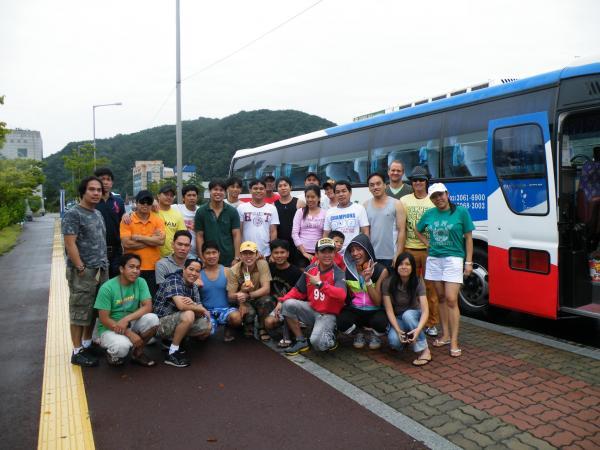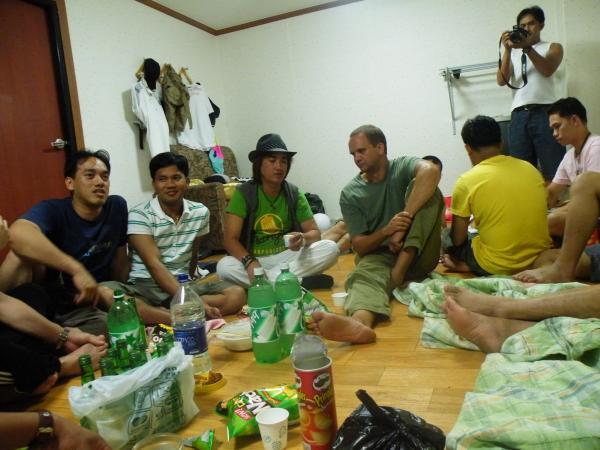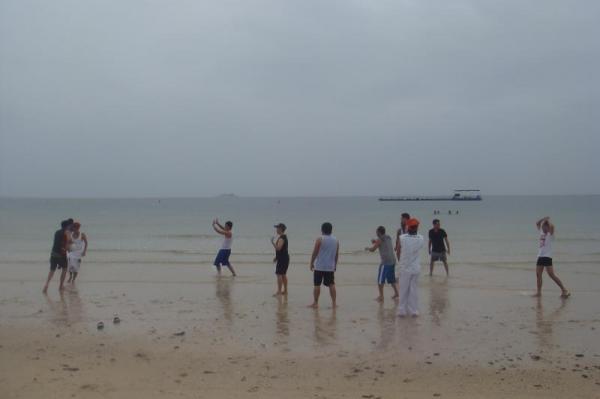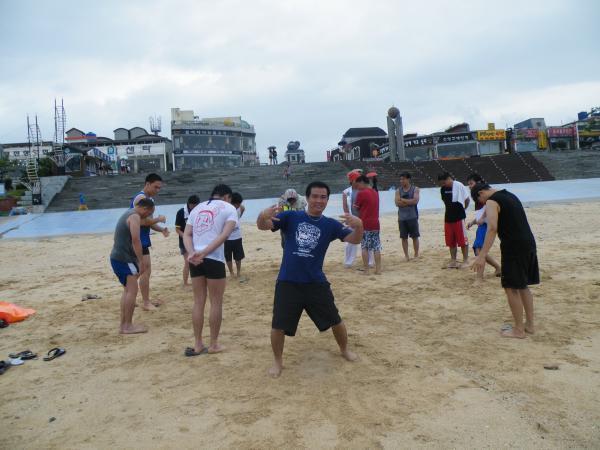Not so sunny for migrant workers
+2
lumad
zack
6 posters
Page 1 of 1
 Not so sunny for migrant workers
Not so sunny for migrant workers
[Viewpoint] Not so sunny for migrant workers
Negligent employers and a tangled government bureaucracy are just a few of the problems facing migrant workers in Korea.
September 08, 2009

Two weeks ago, I spent a Saturday night and Sunday with members of the Filipino EPS Workers Association (FEWA) on a late summer outing to Daecheon Beach in Boryeong, South Chungcheong. The city of Boryeong is known for sponsoring a mud festival in which foreigners, especially, slather themselves with mud found in the area thought to have cleansing effects on the skin. Koreans enjoy it, too, but most of the ads feature foreigners engaged in mud wrestling, mud fights, or standing in groups smiling with their arms draped across one another’s mud-covered shoulders.
The FEWA members couldn’t have cared less about mud. For them, it was a chance to unwind and enjoy each other’s company. We left Seoul’s Hyehwa-dong at 9 p.m. Saturday night on a chartered bus equipped with a karaoke screen and microphone; the singing started less than 10 minutes into the trip and ended as we pulled into the small motel where we would spend the night.
There were two large rooms for about 30 people and the distribution during waking hours was 25 men in one and four women and a child in the other, with a little crossover. The men played cards and visited until dawn while the women tried to sleep on the other side of a thin wall. Rain began in earnest about 3 a.m. It faded to a drizzle when daylight came and didn’t stop until we pulled out in the bus that afternoon.

But that didn’t prevent mid-morning games of volleyball on a nearly deserted beach that on a sunny day would have been teeming with people. One person pointed out the rain made the games possible because it gave the group so much room on the beach. The wind and rain made it chilly, but as long as you kept moving it was bearable. The incoming tide erased the boundaries of the court and arguments over whether a ball was in or out became more difficult to settle. I’ve heard of fights breaking out over basketball games after mass at Hyehwa-dong Catholic Church, which supports a congregation of 2,000 Filipinos, but the volleyball arguments ended peacefully. In fact, laughter predominated, whether it was over a bad serve, someone’s failed attempt to return a volley or a call by the line judge that went against the winning team.

Volleyball was followed by swimming and a game of ocean dodgeball, in which five participants were targets in the middle and another 10 or so stood in two lines facing each other in chest-deep water trying to hit the players in the middle. When that ended I followed a handful of others inside for a shower and dry clothes, but most of the group stayed on the beach in the rain for another two hours. I doubt there could have been more laughter if the day had been sunny.

Two kinds of salted pork, vegetable soup and rice waited when everyone regrouped inside and we enjoyed a big meal, rested for a couple of hours and boarded the bus back to Seoul.

One of the people I met on the trip, a poet and Web site operator who works a factory job here in Korea, said the ability to laugh is what gives Filipinos the strength to carry on in trying situations. Some of the problems he and others on the trip mentioned were non-payment of wages, a tangled government bureaucracy that contradicted itself and verbal abuse at the hands of employers that in the Philippines would have caused a fight, but in Korea was patiently endured. Sometimes, the abuse was also physical.
Because of government regulations, migrant workers are not allowed to bring their families with them, and enough vacation time to visit home is often denied. The same family policy was in place in the United States in the 1800s to keep Asian migrant workers from settling permanently. Migrant workers in Korea are given an initial three-year visa that can be renewed for another three years after leaving the country for a month.
There is legislation in the Korean National Assembly to allow a stay of five years straight without a return visit to one’s home country, but it hasn’t yet taken effect. Migrant worker advocates decry a system that sends experienced workers home. The advocates ask, “Why would you train someone in a job, let them gain expertise and then kick them out?”
It has to be mentioned that it isn’t all bad. Rebenson “Reeve” Recana, FEWA’s founding president, said Korea’s Employment Permit System has advantages not found in other countries, such as the right to seek a change of employment if one is not being paid. In some countries, the only option if you are not satisfied in your work is to return home.
But Korea still has a long way to go. Amnesty International estimated Korea’s migrant worker population at 360,000 in June 2006, making up 1.5 percent of the total workforce. As the number of Chinese, Bangladeshi, Nepalese, Vietnamese, Thai, Filipino and Malay workers here grows, Korea is faced with the challenge of embracing their differences. Ultimately, that will lead to the country’s, not to mention the world’s, prosperity.
*The writer teaches journalism at Ewha Womans University.
by Chris Carpenter
Article Link : http://joongangdaily.joins.com/article/view.asp?aid=2909729
Negligent employers and a tangled government bureaucracy are just a few of the problems facing migrant workers in Korea.
September 08, 2009

Two weeks ago, I spent a Saturday night and Sunday with members of the Filipino EPS Workers Association (FEWA) on a late summer outing to Daecheon Beach in Boryeong, South Chungcheong. The city of Boryeong is known for sponsoring a mud festival in which foreigners, especially, slather themselves with mud found in the area thought to have cleansing effects on the skin. Koreans enjoy it, too, but most of the ads feature foreigners engaged in mud wrestling, mud fights, or standing in groups smiling with their arms draped across one another’s mud-covered shoulders.
The FEWA members couldn’t have cared less about mud. For them, it was a chance to unwind and enjoy each other’s company. We left Seoul’s Hyehwa-dong at 9 p.m. Saturday night on a chartered bus equipped with a karaoke screen and microphone; the singing started less than 10 minutes into the trip and ended as we pulled into the small motel where we would spend the night.
There were two large rooms for about 30 people and the distribution during waking hours was 25 men in one and four women and a child in the other, with a little crossover. The men played cards and visited until dawn while the women tried to sleep on the other side of a thin wall. Rain began in earnest about 3 a.m. It faded to a drizzle when daylight came and didn’t stop until we pulled out in the bus that afternoon.

But that didn’t prevent mid-morning games of volleyball on a nearly deserted beach that on a sunny day would have been teeming with people. One person pointed out the rain made the games possible because it gave the group so much room on the beach. The wind and rain made it chilly, but as long as you kept moving it was bearable. The incoming tide erased the boundaries of the court and arguments over whether a ball was in or out became more difficult to settle. I’ve heard of fights breaking out over basketball games after mass at Hyehwa-dong Catholic Church, which supports a congregation of 2,000 Filipinos, but the volleyball arguments ended peacefully. In fact, laughter predominated, whether it was over a bad serve, someone’s failed attempt to return a volley or a call by the line judge that went against the winning team.

Volleyball was followed by swimming and a game of ocean dodgeball, in which five participants were targets in the middle and another 10 or so stood in two lines facing each other in chest-deep water trying to hit the players in the middle. When that ended I followed a handful of others inside for a shower and dry clothes, but most of the group stayed on the beach in the rain for another two hours. I doubt there could have been more laughter if the day had been sunny.

Two kinds of salted pork, vegetable soup and rice waited when everyone regrouped inside and we enjoyed a big meal, rested for a couple of hours and boarded the bus back to Seoul.

One of the people I met on the trip, a poet and Web site operator who works a factory job here in Korea, said the ability to laugh is what gives Filipinos the strength to carry on in trying situations. Some of the problems he and others on the trip mentioned were non-payment of wages, a tangled government bureaucracy that contradicted itself and verbal abuse at the hands of employers that in the Philippines would have caused a fight, but in Korea was patiently endured. Sometimes, the abuse was also physical.
Because of government regulations, migrant workers are not allowed to bring their families with them, and enough vacation time to visit home is often denied. The same family policy was in place in the United States in the 1800s to keep Asian migrant workers from settling permanently. Migrant workers in Korea are given an initial three-year visa that can be renewed for another three years after leaving the country for a month.
There is legislation in the Korean National Assembly to allow a stay of five years straight without a return visit to one’s home country, but it hasn’t yet taken effect. Migrant worker advocates decry a system that sends experienced workers home. The advocates ask, “Why would you train someone in a job, let them gain expertise and then kick them out?”
It has to be mentioned that it isn’t all bad. Rebenson “Reeve” Recana, FEWA’s founding president, said Korea’s Employment Permit System has advantages not found in other countries, such as the right to seek a change of employment if one is not being paid. In some countries, the only option if you are not satisfied in your work is to return home.
But Korea still has a long way to go. Amnesty International estimated Korea’s migrant worker population at 360,000 in June 2006, making up 1.5 percent of the total workforce. As the number of Chinese, Bangladeshi, Nepalese, Vietnamese, Thai, Filipino and Malay workers here grows, Korea is faced with the challenge of embracing their differences. Ultimately, that will lead to the country’s, not to mention the world’s, prosperity.
*The writer teaches journalism at Ewha Womans University.
by Chris Carpenter
Article Link : http://joongangdaily.joins.com/article/view.asp?aid=2909729

zack- Root Admin

- Number of posts : 315
Reputation : 6
Points : 750
Registration date : 06/02/2008
 Re: Not so sunny for migrant workers
Re: Not so sunny for migrant workers
Zack wrote:[Viewpoint] Not so sunny for migrant workers
Negligent employers and a tangled government bureaucracy are just a few of the problems facing migrant workers in Korea.
September 08, 2009
Two weeks ago, I spent a Saturday night and Sunday with members of the Filipino EPS Workers Association (FEWA) on a late summer outing to Daecheon Beach in Boryeong, South Chungcheong. The city of Boryeong is known for sponsoring a mud festival in which foreigners, especially, slather themselves with mud found in the area thought to have cleansing effects on the skin. Koreans enjoy it, too, but most of the ads feature foreigners engaged in mud wrestling, mud fights, or standing in groups smiling with their arms draped across one another’s mud-covered shoulders.
The FEWA members couldn’t have cared less about mud. For them, it was a chance to unwind and enjoy each other’s company. We left Seoul’s Hyehwa-dong at 9 p.m. Saturday night on a chartered bus equipped with a karaoke screen and microphone; the singing started less than 10 minutes into the trip and ended as we pulled into the small motel where we would spend the night.
There were two large rooms for about 30 people and the distribution during waking hours was 25 men in one and four women and a child in the other, with a little crossover. The men played cards and visited until dawn while the women tried to sleep on the other side of a thin wall. Rain began in earnest about 3 a.m. It faded to a drizzle when daylight came and didn’t stop until we pulled out in the bus that afternoon.
But that didn’t prevent mid-morning games of volleyball on a nearly deserted beach that on a sunny day would have been teeming with people. One person pointed out the rain made the games possible because it gave the group so much room on the beach. The wind and rain made it chilly, but as long as you kept moving it was bearable. The incoming tide erased the boundaries of the court and arguments over whether a ball was in or out became more difficult to settle. I’ve heard of fights breaking out over basketball games after mass at Hyehwa-dong Catholic Church, which supports a congregation of 2,000 Filipinos, but the volleyball arguments ended peacefully. In fact, laughter predominated, whether it was over a bad serve, someone’s failed attempt to return a volley or a call by the line judge that went against the winning team.
Volleyball was followed by swimming and a game of ocean dodgeball, in which five participants were targets in the middle and another 10 or so stood in two lines facing each other in chest-deep water trying to hit the players in the middle. When that ended I followed a handful of others inside for a shower and dry clothes, but most of the group stayed on the beach in the rain for another two hours. I doubt there could have been more laughter if the day had been sunny.
Two kinds of salted pork, vegetable soup and rice waited when everyone regrouped inside and we enjoyed a big meal, rested for a couple of hours and boarded the bus back to Seoul.
One of the people I met on the trip, a poet and Web site operator who works a factory job here in Korea, said the ability to laugh is what gives Filipinos the strength to carry on in trying situations. Some of the problems he and others on the trip mentioned were non-payment of wages, a tangled government bureaucracy that contradicted itself and verbal abuse at the hands of employers that in the Philippines would have caused a fight, but in Korea was patiently endured. Sometimes, the abuse was also physical.
Because of government regulations, migrant workers are not allowed to bring their families with them, and enough vacation time to visit home is often denied. The same family policy was in place in the United States in the 1800s to keep Asian migrant workers from settling permanently. Migrant workers in Korea are given an initial three-year visa that can be renewed for another three years after leaving the country for a month.
There is legislation in the Korean National Assembly to allow a stay of five years straight without a return visit to one’s home country, but it hasn’t yet taken effect. Migrant worker advocates decry a system that sends experienced workers home. The advocates ask, “Why would you train someone in a job, let them gain expertise and then kick them out?”
It has to be mentioned that it isn’t all bad. Rebenson “Reeve” Recana, FEWA’s founding president, said Korea’s Employment Permit System has advantages not found in other countries, such as the right to seek a change of employment if one is not being paid. In some countries, the only option if you are not satisfied in your work is to return home.
But Korea still has a long way to go. Amnesty International estimated Korea’s migrant worker population at 360,000 in June 2006, making up 1.5 percent of the total workforce. As the number of Chinese, Bangladeshi, Nepalese, Vietnamese, Thai, Filipino and Malay workers here grows, Korea is faced with the challenge of embracing their differences. Ultimately, that will lead to the country’s, not to mention the world’s, prosperity.
*The writer teaches journalism at Ewha Womans University.
by Chris Carpenter
Article Link : http://joongangdaily.joins.com/article/view.asp?aid=2909729
Thank you very much sir Chris for the nice article posted at Joongang Daily.

lumad- VIP

- Number of posts : 139
Reputation : 3
Points : 446
Registration date : 15/07/2009
 Re: Not so sunny for migrant workers
Re: Not so sunny for migrant workers
Many thanks for the article Sir Chris..

marzy- FEWA - Administrative Adviser

- Number of posts : 435
Reputation : 3
Points : 628
Registration date : 08/02/2008
 Re: Not so sunny for migrant workers
Re: Not so sunny for migrant workers
Thanks sir Chris:)
Hope to see you again very soon...
Hope to see you again very soon...

goodheart- Board Member

- Number of posts : 851
Location : Seoul, korea
Reputation : 0
Points : 75
Registration date : 11/06/2008
 Re: Not so sunny for migrant workers
Re: Not so sunny for migrant workers
thank you for sharing....God Bless

candy- Seosaengnim

- Number of posts : 475
Reputation : 3
Points : 605
Registration date : 14/05/2009
 Re: Not so sunny for migrant workers
Re: Not so sunny for migrant workers
oh! my guest writer pa...sikat na sikat talaga ang fewa! fighting!

amie sison- SULYAPINOY Literary Section Editor

- Number of posts : 2332
Age : 41
Location : seoul
Reputation : 12
Points : 132
Registration date : 07/02/2008
 Similar topics
Similar topics» To All Migrant Workers of korea
» migrant workers exempted....
» FREE Trainings for MIGRANT WORKERS
» Employers can register migrant workers online
» 2010 Crackdown on migrant workers in S. Korea
» migrant workers exempted....
» FREE Trainings for MIGRANT WORKERS
» Employers can register migrant workers online
» 2010 Crackdown on migrant workers in S. Korea
Page 1 of 1
Permissions in this forum:
You cannot reply to topics in this forum
 Home
Home


» MAGTANONG KAY ATTORNEY....FREE LEGAL ADVICE AND ILLEGAL ADVICE
» Komento ng mga nagtake ng exam ng cbt3.?
» Para po sa mga Voluntary Returnee na nag CBT 2016
» Nagbabalik si UISHIRO
» SEVERANCE PAY PROBLEM
» what are the procedures or steps after passing the eps klt exam?
» 13th KLT PBT exam
» sa mga x korean
» Para sa mga sincere...
» medical ng sincere
» ANG DATING DAAN MASS INDOCTRINATION
» HELLO TO EVERYONE
» voluntary exit(dating TNT)
» _DAEGU_.....
» PBT CBT TEST RESULT
» List of Job Center in Seoul Area
» Guide flow para sa mga 1st timer na KLT Applicants.
» Mga mahalagang impormasyon para sa mga nais magtrabaho bilang Factory workers under EPS SYSTEM sa South Korea.
» Para sa mga Magbabakasyon sa Pilipinas
» musta na mga kasulyap specially batch 2010?
» RELEASED EPS workers
» reviewer para sa cbt 3
» looking for a job
» E-7 GROUP!!!
» REMINERS TO ALL NEW TOPIK PASSERS
» List of 12th EPS-TOPIK Passers
» Ang pagbabalik
» MEMBERSHIP
» Magkano po ang pwedeng dalhin pag uwi?
» PAALALA PO SA MGA KA SULYAP>>>>>MUST READ!!!
» SULYAPINOY 1ST ANNIVERSARY VIDEO
» Korean, Japanes,Chinese Language Auditors (Data Analysts) hiring in Concur, Philippines
» nice to be back after 2 years
» Pahelp poNeed work ko po sa daimaru
» job for female
» PARA SA MGA BABAE NA WALA PANG EPI AT NO DATA= DITO KAYO
» sa lahat ng babae na nagtatanong kung MAY PAG-ASA PA BA SILANG MASELECT EH EXPIRED NA VALIDITY NG EXAM
» Sa mga nakaka-alam,pano po ang ginawa ninyo if na hold sa immigration at nblacklisted?
» CCVI REJECTED/CANCELLED